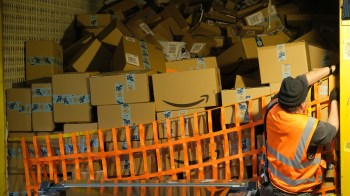TEXT OF STORY
Doug Krizner: All week, we’ve been bringing you Consumed — a special series about shopping as an economic engine. We’ve seen its upsides, like growth. Now, the downsides, like trash. The average American throws out four and a half pounds of garbage per day. Product packaging certainly doesn’t help.
In Europe, one businessman is on a quest to reduce the wrappings, as Marketplace’s Stephen Beard reports.
Stephen Beard: Cosmetics manufacturer Mark Constantine is very critical of his own industry. In his London office, he rips into a rival’s product — literally.
Mark Constantine: Here we’ve got a polythene container. So there we are, and then you’ve got inside, you’ve got a box. And inside the box, you’ve a container with another container inside — and this is going to be an aerosol, isn’t it? So much packaging, it’s unbelievable.
Constantine has waged a long campaign to persuade other manufacturers to eliminate their packaging as far as possible. Not an easy task, says marketing professor Patrick Barwise.
Patrick Barwise: First of all, there are some practical reasons for using packaging, which is to get the product from the factory to the consumer in the best possible conditions.
And, he says, there are powerful marketing reasons for manufacturers to package their goods:
Barwise: You want the product itself to be displayed as attractively as possible. And you’re also trying to publicize the brand, particularly at the point of sale where there are so many other brands on display in the supermarket.
But in his global network of 490 shops, Mark Constantine has defied the commercial logic behind packaging. He’s the founder of Lush Cosmetics — 70 percent of its soaps, shampoos and skin-care creams are solid — and unwrapped.
Lush salesman: This is our solid shampoo bar, they’re absolutely amazing. You just wet the hair, and rub the bar straight into the scalp . . .
Constantine and his colleagues say the environmental cost of packaging is too high — not only because of the extra garbage. Manufacturing, storing and shipping all that packaging also consumes vast amounts of fossil fuel.
But how does Constantine protect his unwrapped products in transit?
Constantine: You have to have short supply chains, because if it comes a long way it’s going to get damaged. And then someone won’t buy it, because it doesn’t look right. So, shorter supply chains — which is environmentally better, anyway, because it means that you’re manufacturing locally with local materials, and then you’re shipping it to your shop.
Since he’s selling his products in his own shops, he doesn’t need fancy packaging to catch the consumer’s eye.
Harry Blamare, manager of one of Lush’s central London stores, says the lack of wrapping actually attracts consumers:
Harry Blamare: It’s one of our biggest signatures — the fact that we don’t have packaging on our products means that you can smell the products a lot stronger. So when you’re walking down the street, you know there’s a Lush there, because you can smell it from 20 yards away.
The strongest argument for scrapping the wrapping is economic, says Constantine. Packaging accounts for up to three-quarters of the cost of manufacturing cosmetics. Cut it out, and everyone — except the packaging companies — wins.
Constantine: You make a little extra money, you can put much better materials in the finished product, and you can sell it for a little less. So everyone gets more benefit, including the environment. So environmental principles are extremely good when it comes to business. They’re not, you know, they’re not something else — they are intrinsic business principles.
He says that many other manufacturers with quite mundane products could boost their sales and profits by unwrapping their goods and gaining a green reputation. It is, metaphorically, a matter of re-packaging.
In London, this is Stephen Beard for Marketplace.
There’s a lot happening in the world. Through it all, Marketplace is here for you.
You rely on Marketplace to break down the world’s events and tell you how it affects you in a fact-based, approachable way. We rely on your financial support to keep making that possible.
Your donation today powers the independent journalism that you rely on. For just $5/month, you can help sustain Marketplace so we can keep reporting on the things that matter to you.


















